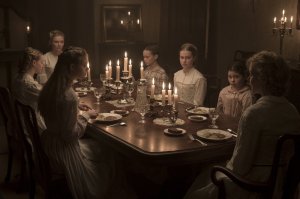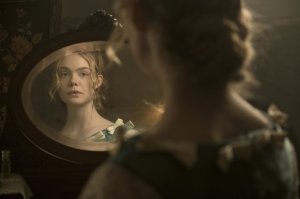“Are you frightened?”
The Beguiled is not the sort of film where you should ever try to dwell upon any one thing it tries to be about. It’s too sprawling, too swift and suffocating, the dramaturgy so distanced it would be enough for a film school student to write an entire senior thesis on. The antiquated ideals reside next to the encroaching post Civil War ramifications, the rapidly onset disillusionment layered and leaking sexuality from a carefully poured kettle. Historical currents flow through all of its underground sewage tunnels, rarely bubbling above the surface. But make sure to look out when they do. Here’s a film that blisters and bakes in a stifling Southern Gothic heat, seducing its own characters button by button and testing the audience’s ability to think critically. The Beguiled is like a tattoo stamped on our arm sleeve while in a numbed slumber; the pain doesn’t come from the process, but from the lingering and irremovable impression it seals on our skin with a snickering and insincere kiss.
We’re never privy to Miss Farnsworth’s (Nicole Kidman) Virginia located Seminary for Young Ladies before a man, the badly wounded Union corporal John McBurney (Colin Farrell), is stumbled upon by young Amy (Oona Laurence) while she forages for mushrooms. His presence immediately changes the chemical equation in the overgrown estate, the younger women always eager to ask if they can go greet the Confederates as they pass by the gates. While they cling to a life destined to soon change, McBurney represents a respite from their worries and an opportunity to maintain an illicit normalcy. His injured leg is mended and sewn by Miss Farnsworth, her hands trembling as she bathes him and the sponge meets his pelvis. Edwina Morrow (Kirsten Dunst), the eldest and most apt pupil is the teacher. She fawns and blushes at his spoken advances. The just-of-age Alicia (Elle Fanning), a curious and bored student, kneads McBurney’s doughy insides with a hushed gaze, sultry smile, and an airy articulation.
Performed with great genius by Farrell as a flirt for all ages, McBurney is a rattlesnake who charms us with his chameleon approach, wooing these prim Christian ladies with friendly concern or overt double entendres (most obviously him telling the high-strung and churlish Farnsworth her rose bushes need trimmed.) He’s a mercenary with no place to go besides confinement should they turn him over; the ladies are bent by the laws of attraction, not inherently angled towards sexuality, nor is McBurney, but collectively more inclined to flirt with the possibility of drifting back towards the center of their comfort zones best suited for their manless manor. The Beguiled rips the pages away from 19th century history books and hides them within the binding of Men Are From Mars, Women Are From Venus, embroidering its context in a blistering affront that’s littered with not so obvious subtext. This is a grueling, punch for punch fight that goes the distance. You feel it its rhyme and rhythm in the early rounds, lulling us into a routine beat, all before the film lands a sharp right uppercut. It’s a KO.
Nearly everything about Sofia Coppola’s take on Thomas Cullinan’s novel is an improvement compared to Don Siegel’s wildly tone-deaf and exploitative 1971 film interpretation. Widely (and wrongly) criticized for removing the only slave character, not only is Coppola’s take more socially relevant and pertinent to various time periods, it’s also historically correct. The difference is in the approach. Siegel identified with the rooster in the henhouse whereas Coppola focuses on the characters laying the story’s eggs. As such, the ’71 film feels more like a soft-core Cinemax porno than it does a social critique, finding a passionless Clint Eastwood starring in a role all too suited to his Dirty Harry persona (hell, he makes out with a minor in the opening minutes after saying she’s, “old enough for kisses.”) Siegel’s film lacks grace or subtlety, the inner-narration from every character a lazy writing/directorial move that could have challenged the actors to share such emotions through their performances. In contrast, Sofia Coppola’s The Beguiled is a formal affair told with pensive prayer and poise.
Two middle-aged women voiced their opinions post my screening. “I’m no ‘filmmaker,’ but I could have made a way better movie.” Her friend chimed in with, “I’m going to make sure I tell everyone I know to not go see it.” That’s arrogance and ignorance and a blindness to artistic endeavors. Those are the same types of people who blame their botched execution of timeless recipes; they forget that the knife is in their own hands. An appropriate critique of Sofia Coppola would be that she’s made the same film time and time again. Whether that be from a place of self-interest or pity or her own perfectionist outlook, she tends to focus her lens on beautiful vagrants of the privileged class. You could define her style as a combination of the feminist realism found in French New Wave heroine Agnès Varda’s work with the cold-hearted nature of an Anthony Minghella film. Blend it together and you get Coppola’s odd, challenging, introspective approach. By its very nature, The Beguiled will immediately turn off audiences wanting to be thrilled and excited. I applaud her individuality, because Coppola has earned her right to avert expectations, and with her latest has directed a laborious, at times tedious story deserving of a sharp scalpel for a proper dissection. Lost in Translation might be her best film thus far, but The Beguiled is far and away her most visually present and meaningful picture. The images are her stamps, so carefully peeled and placed, and she sends them to us with a snide grin at the sake of her characters’ own chagrin, their inner vexations, and their imprisoned identities.
“The enemy, as an individual, is not what we believe.”
Rating: 4 out of 5





For a movie that is supposed to be a Southern Gothic tale, it seemed to lack any dramatic punch, aside from Colin Farrell’s performance in the last 20 minutes. When one has to struggle hard to stay awake through a story like “The Beguiled”, then there is somethinng seriously wrong.
I’m sorry, but I find Sofia Coppola’s take on this story rather boring.
LikeLiked by 1 person
That’s fair, although I did think Kidman and Dunst were even better than Farrell, and loved the cinematography. Still found it to be a far stronger film than the original. Thanks for checking out my review!
LikeLike
Pingback: The 2018 Academy Awards: Thoughts and Predictions | Log's Line·